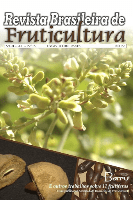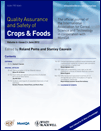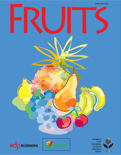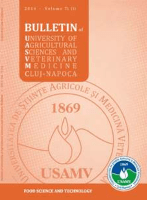
OCL-Oilseeds and Fats Crops and Lipids
Scope & Guideline
Elevating Standards in Agronomy and Biochemistry
Introduction
Aims and Scopes
- Oilseed Crop Improvement and Genetics:
Research on the genetic diversity, breeding, and agro-morphological traits of oilseed crops such as safflower, rapeseed, and soybean. This includes studies on genetic variation and the development of improved cultivars. - Extraction and Processing Technologies:
Studies focusing on the methodologies for oil extraction, including novel techniques and optimization of existing processes. Emphasis is placed on the physicochemical properties of oils derived from various seeds and their quality assessments. - Nutritional and Functional Properties of Oils:
Investigations into the health benefits and nutritional aspects of oils, including the role of omega-3 fatty acids and the potential of various oils in functional foods and therapeutic applications. - Sustainable Agricultural Practices:
Research that assesses sustainable practices in oilseed cultivation, including the impact of organic fertilizers, irrigation strategies, and the adoption of mechanization. - Geospatial and Environmental Assessments:
Studies that evaluate land suitability for oil palm and other oilseed crops, integrating geospatial data to inform agricultural decisions and policy. - Biotechnological Innovations:
Research that explores biotechnological approaches for the sustainable production of oleochemicals and the use of alternative lipid sources, including microalgae and insects.
Trending and Emerging
- Sustainable and Organic Farming Practices:
An increasing number of studies emphasize organic farming practices and sustainable oilseed production, highlighting the importance of environmental stewardship in agriculture. - Health and Nutrition Related to Lipids:
There is a growing trend towards exploring the health implications of dietary lipids, particularly omega-3 fatty acids, and their roles in human health and disease management. - Innovative Extraction Techniques:
Research on novel extraction methods, including green technologies and biotechnological processes, is gaining traction as the industry seeks to improve efficiency and reduce environmental impact. - Land Use and Geospatial Analysis:
The application of geospatial tools to assess land suitability for oilseed cultivation is becoming increasingly relevant, reflecting the need for informed agricultural planning in response to climate change. - Functional Food Development:
The development of functional foods that leverage the unique properties of oils and fats is emerging as a significant theme, driven by consumer demand for healthier food options.
Declining or Waning
- Traditional Oilseed Crop Studies:
Research on traditional oilseed crops has seen a decline as newer crops and methods gain attention. This shift may be due to the increasing interest in high-value, non-conventional oilseeds. - Chemical Analysis of Conventional Oils:
While chemical characterization remains important, the focus has shifted towards innovative extraction and processing methods rather than just compositional analysis of conventional oils. - Basic Agronomic Practices:
There is a noticeable decrease in studies focused solely on basic agronomic practices for well-established oilseed crops, as the field moves towards more complex interactions and integrated approaches.
Similar Journals

Revista Brasileira de Fruticultura
Elevating Research in Agronomy and HorticultureRevista Brasileira de Fruticultura, published by the Sociedade Brasileira de Fruticultura, is a leading scholarly journal dedicated to the advancement of research in the fields of agronomy, crop science, food science, horticulture, and plant science. With an impressive Open Access model adopted since 2001, the journal is committed to disseminating high-quality research from Brazil and beyond, promoting innovation and collaboration among researchers, professionals, and students alike. The journal currently holds a respectable Q3 category ranking in multiple fields as of 2023, reflecting its significance within the scientific community, specifically ranked #72 in horticulture and #257 in agronomy, among its peers. The Revista Brasileira de Fruticultura not only serves as a platform for original research articles, reviews, and case studies but also emphasizes practical applications and sustainable practices in fruit cultivation. Its aim is to enhance the visibility of Brazilian fruit research on a global scale, making it an invaluable resource for those invested in advancing horticultural sciences.

MOLECULAR BREEDING
Transforming Agriculture with Innovative Molecular InsightsMOLECULAR BREEDING is a prestigious journal published by Springer, dedicated to advancing the field of agronomy, plant science, and biotechnology through innovative research contributions. With an impressive ISSN of 1380-3743 and E-ISSN 1572-9788, this journal has continuously served the scientific community since its inception in 1995. Operating from the Netherlands, MOLECULAR BREEDING is recognized for its high impact factor and status in the Q1 quartile for both Agronomy and Crop Science and Plant Science in the latest 2023 metrics, highlighting its influential role in these domains. With strong Scopus rankings reflecting its position within the top percentiles of various related fields—including a notable 81st percentile in Plant Science—this journal is essential for researchers, professionals, and students striving to understand and innovate in molecular genetics and breeding techniques. Although it does not provide open access, its rigorous peer-review process ensures that published articles maintain the highest standards and contribute significantly to the scientific discourse. The journal’s diverse scope encompasses significant advancements in molecular biology and genetics, ultimately supporting the global objectives of sustainable agriculture and enhanced crop resilience.

Quality Assurance and Safety of Crops & Foods
Transforming research into actionable food safety practices.Quality Assurance and Safety of Crops & Foods is a leading peer-reviewed journal, published by CODON PUBLICATIONS, dedicated to advancing the fields of Agronomy and Crop Science and Food Science. Since its inception in 2009, this journal has established itself as a crucial platform for researchers, professionals, and students, focusing on the vital intersection of agricultural safety and food quality. With a commendable impact factor and a current Scopus ranking placing it in the top quartiles of its field (Q2 in 2023), it serves as an essential resource for those committed to ensuring the safety and quality of global food supplies. The journal provides open access options to enhance the dissemination and accessibility of research findings, thus fostering collaborative efforts to tackle contemporary challenges in food production and safety. By showcasing innovative methodologies and cutting-edge research, Quality Assurance and Safety of Crops & Foods not only contributes to scientific discourse but also plays a pivotal role in informing policy and practice in sustainable agricultural practices.

Journal of Oil Palm Research
Unlocking Knowledge for a Sustainable Oil Palm IndustryJournal of Oil Palm Research is a pivotal publication in the field of agricultural science, specifically focusing on the multifaceted aspects of oil palm cultivation, research advancements, and sustainability practices. Published by the MALAYSIAN PALM OIL BOARD, this journal serves as a significant platform for disseminating high-quality research and innovative solutions in oil palm agronomy, genetics, and socio-economic impacts, capturing the interest of researchers, industry professionals, and students alike. With an E-ISSN of 2811-4701, the journal is committed to presenting peer-reviewed articles that aim to enhance the understanding of oil palm's role in global agriculture and its contributions to environmental sustainability. The absence of a traditional access fee underscores its dedication to open access principles, fostering broader dissemination of knowledge. As the oil palm industry continues to evolve amidst environmental and market challenges, the Journal of Oil Palm Research remains essential for those dedicated to this field, offering insights that inform practice and policy.

Legume Research
Nurturing Research for Food Security and Ecological BalanceLegume Research, published by the AGRICULTURAL RESEARCH COMMUNICATION CENTRE in India, is an essential peer-reviewed journal focusing on advancements in the field of agronomy, crop science, soil science, and plant science. With an ISSN of 0250-5371 and operating since 2008, this journal caters to researchers, agricultural professionals, and students interested in the critical role of legumes in sustainable agriculture and food security. It ranks within the third quartile (Q3) in several prominent categories, reflecting its contribution to the agricultural and biological sciences community—ranking #279 in Agronomy and Crop Science, #113 in Soil Science, and #376 in Plant Science based on Scopus metrics. Although not open access, Legume Research remains a vital resource for those seeking to enhance their knowledge and contribute novel research findings in the ever-evolving discipline of legume cultivation and utilization. With a clear objective to disseminate impactful research, this journal significantly contributes to the global understanding of legumes' ecological, economic, and nutritional importance.

Revista Fitotecnia Mexicana
Cultivating Innovations in Agronomy and Crop ScienceRevista Fitotecnia Mexicana is a prominent academic journal published by the SOC MEXICANA FITOGENETICA, dedicated to advancing knowledge in the fields of agronomy, crop science, genetics, horticulture, and plant science. With its establishment dating back to 2007 and currently running through 2024, this journal serves as an important platform for researchers, professionals, and academic institutions interested in plant genetic resources and agricultural innovations. Although it holds a Q4 quartile ranking in various categories and is positioned within the lower percentiles in Scopus rankings, it provides crucial insights and opportunities for emerging ideas and local research initiatives. Based in Mexico, and with its indexed ISSN 0187-7380, the journal plays an important role in stemming from the rich agricultural heritage of the region. The lack of open access options underscores the depth of curated content provided, making it a valuable resource for professionals seeking to expand their expertise in the sector.

ITALIAN JOURNAL OF FOOD SCIENCE
Bridging Tradition and Innovation in Food ScienceITALIAN JOURNAL OF FOOD SCIENCE is a distinguished open-access publication dedicated to advancing knowledge in the field of food science, catering to a global audience of researchers, professionals, and students. Published by Codon Publications in Singapore, this journal, operating under the ISSN 1120-1770 and E-ISSN 2239-5687, has been a vital platform for scholarly discourse since its inception in 1996, converging towards a comprehensive view of food science trends through 2024. With an impressive ranking in the third quartile (Q3) of the Food Science category and a Scopus rank of #151 out of 389, the journal plays a significant role in disseminating high-quality research, contributing to a richer understanding of food science within the agricultural and biological sciences. Since transitioning to open access in 2008, it has further expanded its reach, ensuring that innovative research is accessible to all, thereby fostering collaboration and knowledge exchange in this vital industry.

Fruits
Cultivating Knowledge, Harvesting Innovation.Fruits, published by the International Society for Horticultural Science (ISHS), is a pivotal journal in the fields of Agronomy, Food Science, and Horticulture. Since its inception in 1995 and with a continued publication from 2001 to 2024, this journal provides a platform for innovative research and advancements related to fruit science, covering an array of topics from cultivation techniques to post-harvest processing. With an ISSN number of 0248-1294 and an E-ISSN of 1625-967X, *Fruits* engages a global audience, operating out of France and serving as a vital resource for academics, industry professionals, and students alike. Despite its current categorization as Q4 in Agronomy and Crop Science and Q3 in both Food Science and Horticulture, the journal is committed to fostering high-quality research and enhancing its visibility within the academia, as reflected in its Scopus rankings. Readers can expect rigorous peer-reviewed articles that contribute significantly to the understanding of fruit-related science, ultimately driving the advancement of sustainable practices in the field. Emphasizing accessibility, while currently not open access, *Fruits* remains dedicated to disseminating valuable knowledge to enhance the communal pursuit of excellence in horticultural research.

SPANISH JOURNAL OF AGRICULTURAL RESEARCH
Exploring Solutions for a Greener TomorrowThe Spanish Journal of Agricultural Research (ISSN: 1695-971X, E-ISSN: 2171-9292), published by the prestigious Consejo Superior Investigaciones Cientificas (CSIC), serves as a vital resource for those engaged in the fields of agronomy and crop science. Established as an Open Access journal since 2003, it aims to foster the dissemination of innovative research and practical applications related to agricultural practices and sustainability. With its Q3 category in Agronomy and Crop Science and a Scopus ranking of #224 out of 406, the journal provides an accessible platform for scholars to share valuable findings that enhance agricultural productivity and environmental stewardship. Covering research from 2006 to 2024, this journal continues to be instrumental for researchers, professionals, and students eager to remain at the forefront of agricultural science advancements.

Bulletin of University of Agricultural Sciences and Veterinary Medicine Cluj-Napoca-Food Science and Technology
Cultivating Knowledge for Global Food SystemsBulletin of University of Agricultural Sciences and Veterinary Medicine Cluj-Napoca - Food Science and Technology is a prominent peer-reviewed journal dedicated to advancing the field of food science and technology. Published by the University of Agricultural Sciences and Veterinary Medicine Cluj-Napoca, this open-access journal has been serving the academic community since 2013, promoting the dissemination of high-quality research that addresses pressing issues in food safety, quality, and innovation. With its ISSN 2344-2344 and E-ISSN 2344-5300, the journal aims to bridge the gap between academia and industry by providing a platform for scholars and practitioners to share their findings, insights, and methodologies. Situated in the heart of Romania, the journal reflects the country's rich agricultural heritage and its commitment to enhancing global food systems. By maintaining a rigorous editorial standard, the Bulletin ensures that it remains a vital resource for researchers, industry professionals, and students who are keen to explore the latest developments in food science.